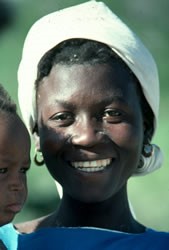Haitians are almost entirely descended from African slaves, who were brought to Haiti by European colonizers. Their job was to harvest sugar, coffee, and timber. Then, in the 1790s, former slaves Toussaint L'Ouverture and Jean-Jacques Dessalines rebelled against France. They won their independence from France in 1804.
However, since its independence, centuries of economic, political, and social difficulties have put Haitians in severe poverty. A century of paying reparations to France (amounting to $22 billion in today's money) prevented Haiti from developing its infrastructure and society. It is now the poorest country in the Western Hemisphere, with 80% of Haitians in poverty and 60% unemployed, and the number may continue to rise.
About 40% of Haitians live in the country, but due to lower prices in food imports, an increasing number are moving to urban areas. Many are even emigrating, sometimes illegally, to other countries like the U.S. and the Dominican Republic. They live in 14 countries, including their own country, Haiti.
Through unplanned development, many of Haiti's natural resources are gone and the soil is depleted. Haiti has almost total reliance on food imports. Ironically, agriculture dominates Haiti's economy. Their subsistence crops include cassava, plantains, corn, sweet potatoes and rice. Arabica coffee is the main cash crop, and sugar cane is the second. Outside of farming, casual jobs and self-employment are more common than steady wage jobs. Transportation in rural areas is accomplished mostly by bicycle, public bus (or tap-tap, as they call it), and donkey (MacLeod et al. 2020).
Some Haitians practice voodoo. Others are Christians in name only who believe that tradition is the way to salvation. More than half of the population identifies itself as Roman Catholic, with 1/4 being Protestant. Older Protestant denominations like Methodists, Episcopalians, and Presbyterians were established in the 1800s, while Baptists, Mormons, and Seventh-day Adventists came from 1915-1934 when the U.S. occupied the country. Western culture has been an influence on the country, causing some Haitians to replace faith with secularism.
Poverty has been a major scourge for Haitians, not only in Haiti but everywhere else they live.
Haiti is plagued by criminal gangs that exacerbate their poverty and misery. Few have indoor water, and the water is not fit to drink. Therefore, waterbor
Pray for the Lord to raise up servant leaders in Haiti who can lead them out of poverty.
Pray for them to get training that will lead Haitians into high-paying jobs.
Pray for a Holy Spirit-empowered revival that will purify their churches and thrust them out as a mission force to the spiritually lost.
Pray for Haitian disciples who will make more disciples, that will be a blessing to Haiti and beyond.
Scripture Prayers for the Haitian in Haiti.
https://en.wikipedia.org/wiki/Haitians
https://en.wikipedia.org/wiki/Culture_of_Haiti
https://www.bbc.com/news/world-latin-america-47799258
https://www.cfr.org/backgrounder/haitis-troubled-path-development https://www.britannica.com/place/Haiti/Government-and-society https://www.google.com/amp/s/amp.theguardian.com/world/2008/jul/29/food.internationalaidanddevelopment
| Profile Source: Joshua Project |










